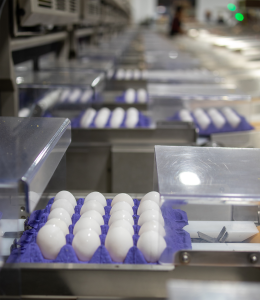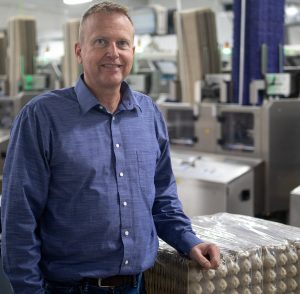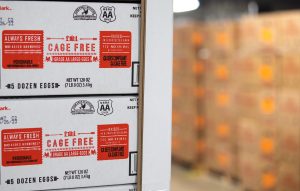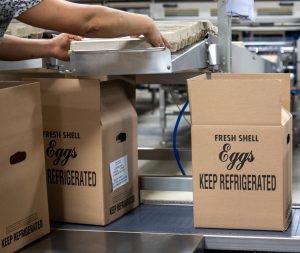An unexpected request from a longtime customer led Minnich Eggs to hatch plans for a major expansion to break into a new market: cage-free eggs.

Equipment in the cage-free egg processing center on the Minnich Eggs campus measures, sorts and packs eggs. The agribusiness received its first inquiry about selling cage-free eggs in 2019 after the California legislature passed a law requiring eggs sold in the state to be cage-free.
Minnich Eggs received more than $220,000 in Power Moves® rebates from Jay County REMC, its local electric cooperative, for energy efficient LED lighting in an expansive addition that includes six layer houses, a processing facility and additional buildings to house cage-free hens. The new layer houses include dimmable LEDs, which use less energy than other kinds of lighting and allow for control to simulate natural daylight.
“It’s been fantastic to work with the Power Moves program,” said Steve Reier, chief financial officer of Minnich Eggs. “We’ve learned a lot about energy savings the last 10 years.”
Minnich Eggs received the first inquiry about cage-free eggs in 2019 after the California legislature passed a law requiring all eggs sold in the state to be cage-free. That’s when a California-based longtime Minnich customer contacted the agribusiness, prompting officials to consider the opportunity.
More than 1 million hens were added in the cage-free expansion; Minnich Eggs currently houses about 4 million hens in all. About one-third of the company’s business is from selling cage-free eggs, which parallels the overall egg industry, Reier said.

Steve Reier, the chief financial officer for Minnich Eggs.
“We’re trying to figure out where we should be at,” Reier said. “We know where the market is, and we try to match that with our production.”
Minnich Eggs received its first Power Moves rebate in 2013. In the decade since, the agribusiness has collaborated with Jay County REMC on rebates for energy efficiency upgrades to a variety of buildings, including layer houses, a breakroom and other locations on the company’s campus in Portland, Indiana.
The company also has worked closely with Mary Miller, an engineer on the Power Moves team, for advice on projects and troubleshooting. Miller has advised Minnich Eggs on “everything from lighting to refrigeration, cooling units” and even resolving an insulation issue with coolers, Reier said.
“We’ve leaned on Mary quite a bit through the process, with her being a teacher and us the students,” he added. “It’s not only me, but others in the company.”

Packed eggs in the Minnich Eggs cage-free egg processing center ready to be shipped. The company sells cage-free eggs to multiple stores, including Amazon and Walmart; Minnich eggs can be found in stores across the United States and in Guam.
The new layer houses for cage-free hens include systems to control feeding the chickens, efficiently control ventilation and a system to move the eggs from each of the layer houses to a processing center. The company also worked with Jay County REMC when installing a solar array to help power the campus on sunny days.
“Minnich Eggs is a poster child for how a business can leverage the Power Moves program to maximize long-term energy savings to reduce costs and improve operations,” said Neil Draper, president and CEO of Jay County REMC. “By working with their local electric cooperative very early in the process, businesses can work through all of the different options available and be sure they are aware of different unique options.”

A Minnich Eggs employee packs egg cartons into a box at the company’s processing center for cage-free eggs in Portland, Indiana. The company received more than $220,000 in Power Moves® rebates for energy efficiency upgrades installed in six new layer houses and additional structures to house cage-free hens as the agribusiness expanded into the market for cage-free eggs.
Minnich Eggs had started construction on the cage-free expansion when the COVID-19 pandemic hit, halting the project. The company that sold Minnich the control systems for the layer houses were supposed to install them; the disruption caused Minnich employees to install them instead. They learned how to assemble everything from specially created YouTube videos from the company.
A 2022 avian influenza outbreak across the U.S. led to additional uncertainty in the egg market, causing prices to fluctuate. Minnich Eggs had to add biosecurity measures to minimize exposure risk to the flocks.
The company’s expansion has been successful despite the recent challenges. Minnich Eggs sells multiple sizes of cage-free eggs from small to jumbo; and packs cage-free eggs for multiple stores, including Amazon and Walmart. Minnich products can be found throughout the United States from California to Virginia, and even in Guam.
Reier expects that the demand for cage-free eggs will continue to grow, though recent events have made it more difficult to plan long-term.
“It’s hard to know what the market is going to be. There are so many unknowns,” Reier said. “You just have to take opportunities when you see them.”

